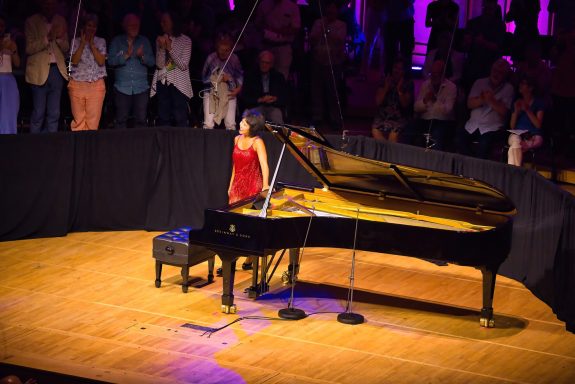 United States Tanglewood Festival 2024 [4]: Yuja Wang (piano). Ozawa Hall, Lenox, 17.7.2024. (CSa)
United States Tanglewood Festival 2024 [4]: Yuja Wang (piano). Ozawa Hall, Lenox, 17.7.2024. (CSa)

Shostakovich – Prelude and Fugue, Op.87, No.2; Prelude, Op.34, No.12; Prelude, Op.34, No.10; Prelude, Op.87, No.8; Prelude, Op.34, No.24; Prelude, Op.34, No.5; Prelude, Op.34, No.16; Prelude and Fugue, Op.87, No.15
Barber – Piano Sonata in E-flat minor, Op.26
Chopin – The Four Ballades: No.1 in G minor, Op.23; No.2 in F, Op.38; No.3 in A-flat, Op.47; No.4 in F minor, Op. 52
Many of us have attended good concerts, recitals and opera productions over the years and from time to time some great ones. There are, however, few occasions when a musical event is so outstanding that it remains etched indelibly in the memory. I still recall an historic series of Anglo-Soviet musical exchanges organised by the late impresario Victor Hochhauser at the height of the Cold War. I was just 12 years old when my father took me to the Royal Festival Hall to hear David Oistrakh, Mstislav Rostropovich and Sviatoslav Richter. Or, some seven years later, taking myself to the same venue to witness a brilliant performance of The Rite of Spring brilliantly conducted by the diminutive 88-year-old Stravinsky, who responded to a thunderous ovation and calls for an encore by returning to the platform dressed in a long black overcoat. Or, in 2008, to see the great Daniel Barenboim play all 32 of Beethoven’s mature piano sonatas. These were not merely significant moments in musical history, but occasions where one’s senses were simply overwhelmed by the supreme artistry on display.
I experienced something similar on this occasion at a stunning recital of Shostakovich, Barber and Chopin in Ozawa Hall, Tanglewood, by the preternaturally gifted US/Chinese pianist Yuja Wang. Born in Beijing 37 years ago to a percussionist father and a ballerina mother, Yuja studied piano at the Beijing Central Conservatory before receiving further training in Canada and at the Curtis Institute of Music under the American concert pianist Gary Graffman. Glamorously attired in one of her autograph sparking bodycon dresses and a pair of death-defying five-inch heels, she clopped purposely towards the piano to applause and cheers normally reserved for American Idol contestants. Once seated at the keyboard, she limbered her shoulders, rolled her head, straightened her back (a ballet dancer’s posture perhaps inherited from her mother), and arms outstretched, began to play. From this point the glitter was confined to the music. There was nothing showy or affected about her performance style. On the contrary, once at the keyboard her dazzling technique was executed with intense concentration, economy and grace.
The recital began with a selection of six of Shostakovich’s 24 Preludes and two Preludes and Fugues. Written between December 1932 and March 1933, when he was under official investigation by the Soviet sensors, these works reflect the composer’s wry, sardonic humour, dissident playfulness and explosive anger. Alternating passages of great delicacy and percussive rage, and playing with the utmost clarity, Wang perfectly captured their complex emotional range.
Next came the rarely performed Piano Sonata in E-flat minor by Samuel Barber. Those familiar with his earlier String Quartet Op.11, which incorporates his beguiling Adagio, will find the composition in E flat an untypically dissonant work. It was, as Robert Kirzinger’s helpful programme note informed us, commissioned in 1947 by Irving Berlin and Richard Rodgers and written with Vladimir Horowitz in mind. Wang attacked the first two movements with the fiery percussive force which doubtless her father would have appreciated. In stark contrast, she brought a restrained calm to the third movement Adagio. A terse Scherzo provided the introduction to a final fugue – thrilling, impulsive, edgy – but always carefully controlled.
The second half of the recital was dedicated to Chopin’s Four Ballades. These are grand Romantic works full of emotional extremes. According to the great Chopin interpreter Leif Ove Andsnes, ‘Those playing [them] have to balance multiple voices, find where to breath, but also where to maintain momentum’. In all these respects, Wang’s playing was peerless. Each piece was beautifully articulated with dizzying passages of emotional fervour suffused with melancholy and counterpoised with gossamer lightness of touch. Hers was a performance that thrilled the senses and touched the soul.

Breathtaking virtuosity, emotional sensitivity and acute musical intelligence are not the only qualities that Wang brings to the concert platform. She is also generous to a fault. On this occasion, no less than five encores rewarded the roaring applause. Piano Study No.6 by Philip Glass came first, followed by a pyrotechnical account of the Scherzo from Tchaikovsky’s Pathétique, transcribed by Samuil Feinberg. Then, another Scherzo extracted from Mendelssohn’s A Midsummer Night’s Dream and played here with awesome dexterity. Wang chose to end her wide-ranging recital with a steamy transcription of Danzón No.2 by Arturo Màrquez and a riotous jazz-infused Toccatina by Nikolai Kapustin. Sadly but inevitably it brought an extraordinary recital to a close and one which will remain forever in the memory.
Chris Sallon

Generous with her many gifts. Unforgettable.